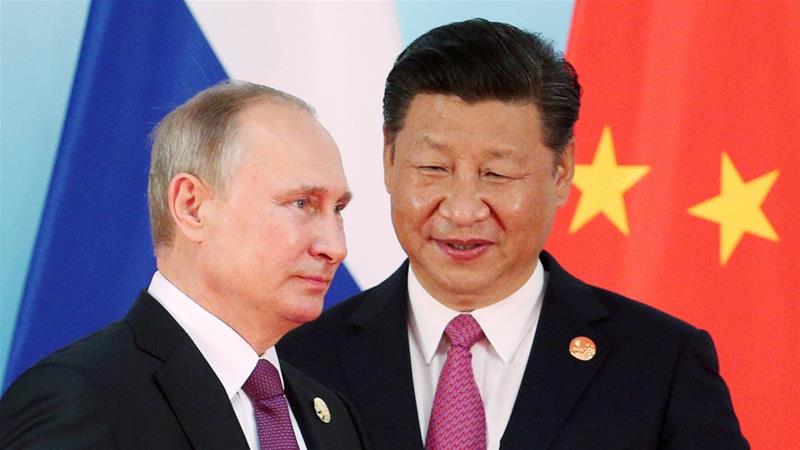China doesn’t want friends. It doesn’t want peaceful borders either. The only thing that China wants is territory- more and more of it. An expansionist China is already claiming maritime territory and islands within the territorial waters and Exclusive Economic Zones (EEZs) of other countries in the South China Sea and Japanese islands in the East China Sea.
In the Himalayas, China is encroaching Nepalese villages and trying to push the LAC further west along the Indo-Tibetan border in Ladakh. And now China is claiming territory of another neighbour- Russia.
At the root of China’s fresh claims in Russian territory is a video to celebrate the 160th anniversary of Vladivostok posted by the Russian Embassy on the Chinese social media website Weibo.
But the land mafia of a country that China has become, it objected instantly to the video posted by Russian Embassy. Chinese diplomats, journalists and jingoistic social media users soon went overboard.
Chinese internet users, including diplomats and officials, claim that Vladivostok used to be a part of China. They claim it was Qing’s Manchurian homeland but was annexed by the Russian empire in 1860 after China was defeated by the British and the French during the Second Opium war.
Shen Shiweim, a journalist at the Chinese State-run broadcaster, China Global Television Network (CGTN) tweeted, “This “tweet” of #Russian embassy to #China isn’t so welcome on Weibo. The history of Vladivostok (literally ‘Ruler of the East’) is from 1860 when Russia built a military harbor. But the city was Haishenwai as Chinese land, before Russia annexed it via unequal Treaty of Beijing.”
This “tweet” of #Russian embassy to #China isn’t so welcome on Weibo
“The history of Vladivostok (literally 'Ruler of the East') is from 1860 when Russia built a military harbor.” But the city was Haishenwai as Chinese land, before Russia annexed it via unequal Treaty of Beijing. pic.twitter.com/ZmEWwOoDaA— Shen Shiwei 沈诗伟 (@shen_shiwei) July 2, 2020
China’s state-owned broadcaster excels in making outrageously far-fetched territorial claims. A couple of months ago CGTN had tweeted, “An extraordinary sun halo was spotted Friday in the skies over Mount Qomolangma, also known as Mount Everest, the world’s highest peak located in China’s Tibet Autonomous Region.”
Here is the tweet the @CGTNOfficial has deleted. Cheers. https://t.co/MC7DzuPQY9 pic.twitter.com/jZfmxZkd3s
— Palki Sharma (@palkisu) May 10, 2020
This was, of course, a part of Beijing’s attempts to alter the position of the highest peak in the world, Mt. Everest by highlighting its Tibetan side and glossing over the Nepalese side.
But China’s claims over Russia’s Vladivostok are not limited to the state-owned media. Even Chinese diplomats have jumped in. Zhang Heqing, a wolf-warrior from China currently stationed at the country’s Mission in Pakistan said, “Isn’t this what in the past was our Haishenwai?”
Meanwhile, the CCP IT cell too has gone berserk. A Weibo user wrote, “Today we can only endure, but the Chinese people will remember, and one generation after another will continue to remember!” SCMP quotes another user as saying, “We must believe that this ancestral land will return home in the future!”
It is outrageous how an expansionist China is making claims based on what happened in the middle of nineteenth century. No one ratchets irredentism as fondly as Beijing.
If Beijing keeps going ahead with this logic, it will claim the territory of every other neighbour. China has border disputes with 18 countries, including Brunei, Tajikistan, India, North Korea, Nepal, Bhutan, Malaysia, Mongolia, South Korea and the Philippines. It claims territories based on historical precedent dating back to the 13th and 14th centuries.
Ancient Chinese dynasties- Ming, Qing and Yuan are at the root of its untenable claims. The world moved past expansionism when World War II ended, but Beijing doesn’t want to understand that.
What this really does is bring an end to the ostensible show of Russia-China camaraderie that was playing out over the past few months. We always knew that Russia doesn’t want to be friends with China, and is forced to maintain seemingly close ties with Beijing only because it has been sanctioned heavily by the West and its top companies pushed out of the dollar-based financial system.
One of the reasons behind Russia’s apprehensions against Beijing is of course China’s territorial claims and border disputes. The Dragon is expansionist and tends to flex its muscles in times of crisis, like it has done now. The knee-jerk reaction from China over the video posted by the Russian Embassy has burst the bubble of goodwill between Moscow and Beijing.
More Sino-Russia conflicts could open up in the coming days. China has a number of ambiguous regions along its Russian border, much like the Line of Actual Control (LAC) and McMohan line with India.
Moreover, Moscow is apprehensive of Chinese investments in the Russian Far-East. This sparsely populated Russian territory boasts of abundant natural resources, and traditionally looks at it as vulnerable to Chinese influence or even colonialization.
China has been eager to invest here in a bid to gain influence but Russia wants to counter this dependence on China that was also writing on the wall with India’s US $1 billion line of credit to Russia for development of the Far East region.
